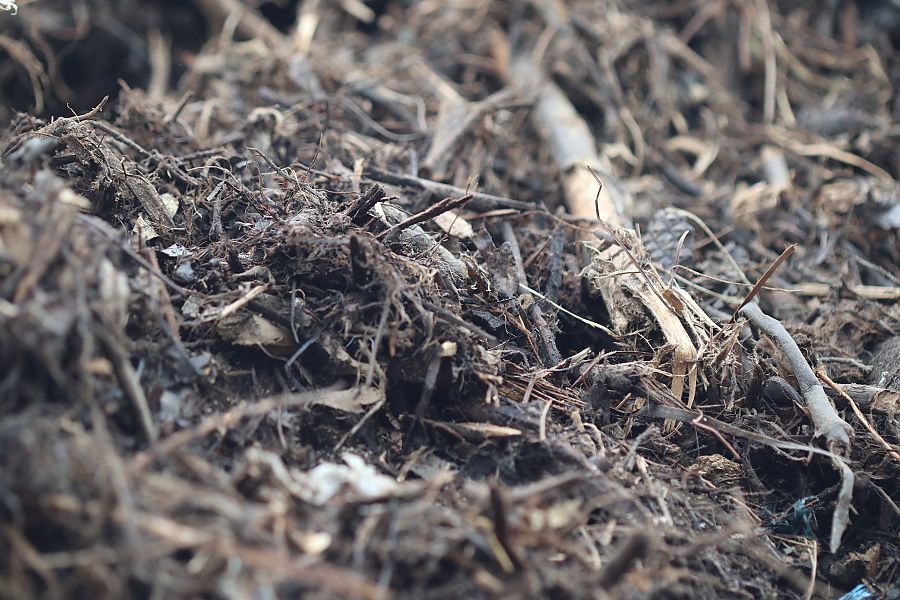The material is made from crushed dried leafless branch and heather.
COMPOSITION
BURÉS PROFESIONAL, S.A., has created the Vegetal Biomass Biofilter from the selection of different filling materials based on 100% vegetable biomass plus treatment in the plant to obtain a material that can absorb odoriferous compounds and other pollutants from the residual air stream. The free-living microorganisms that proliferate naturally in this organic material use these compounds as a source of nutrients and energy, via aerobic decomposition.
BURÉS PROFESIONAL, S.A., has developed this product based on 100% vegetable biomass, high efficiency and long shelf life.
The filling materials undergo a treatment process: selection, mixing, crushing and particle size classification (between 100 mm to 200 mm in diameter).
This processing increases the surface area of the material, enabling the microorganisms to more effectively colonise the medium, and enhancing the creation of a concentration gradient in the biofilm, which maintains a continuous flow of mass, from the gas components to the wet biofilm.
ADVANTAGES AND APLICATIONS
This product can be used as a filling material, or as a layer of a multilayer biofiltration.
Biofiltration is a very versatile technique, able to treat odours (ammoniac…), toxic compounds and volatile organic compounds.
The efficiency of the treatment of this elements is higher than 90-95% for low contaminant concentration (<1.00ppm).
The biofilters offered by BURÉS PROFESIONAL, S.A. is a technological alternative respectful with the environment, with an effective control of the atmosphere’s and odours contamination. Some of its great advantages are the following:
• Simple technology and low application cost; economically available to all business.
• High efficiency of volatile contaminants and odoriferous complexes elimination.
• Odoriferous contamination control.
• Nearly null maintenance of the biofilter is required.
• Total decomposition of the contaminants without secondary products creation through the Biofiltering process.
• The filling material is organic, non toxic and biodegradable through composting once its useful life is over.
USED BIOFILTER WASTE
Once the useful life of the biofilter is exhausted, we take care of the management of organic or inorganic remains.
We are distributors in Spain, Portugal, France, Germany, Italy, Bulgaria, Tunisia, …
The difference between the real and apparent density of the material (four times), provides an idea of its effective percolating capacity.
Optionally, specific plant species can be selected to obtain a specific biofiltration bedding. The most frequent case is heather (Erica sp.), which is widely used in countries such as the United Kingdom and Germany, in mixed heather/peat systems to kill ammonium.
Burés biofiltration materials are extremely stable, with very slow physical and microbiological alteration of their properties over time, so there is practically no compaction of the bedding in the long term.
Appropriate physical and chemical conditions must be created and preserved to allow the microbiotic proliferation on the filling material. The essential parameters are temperature, pH, moisture and nutrient quantity.
Moisture
One of the main challenges of a biofilter care is maintaining the right moisture point. The air is usually moistured before entering the system with a water nebulisation system, moistening chamber, bioscrubber or biological hydrofilter. The moisture depends on the material, but always oscillates in the 50-70% range.
Temperature
The most common microorganisms are mesophyles, which need a 15-35ºC range of temperatures, and have an optimal growth at 30-40ºC. This is the range in which the filling material must be kept.
Granulometry
The granulometry of the filling material affects its efficiency, the granulometry beings the size range of the particles.
The granulometry that provides the biofilter with a larger surface must be found, as it will make it efficient and useful also to purify non-soluble complexes.
The efficiency and useful life of the biofilter depends on the kind of contaminant and its mass, but BURÉS PROFESIONAL, S.A. recommends changing the filling material every 4-5 years, depending on the environmental conditions in which it’s kept. After its useful life the material can be composted without any previous treatment.
Format / Sizing:
Crushed
Ref: 15210
Granulometry> 20 mm
Ref: 15220
COMPOSED Granulometry> 20 mm
P15230


